ARTICLE 19 examines how the Iranian regime is strengthening its hold over the internet through its Supreme Council of Cyberspace (SCC).
This statement was originally published on article19.org on 23 July 2024.
Following every national uprising, the Islamic Republic pays special heed to further centralising and tightening control over the internet, prompting a new era of digital repression. In this report, ARTICLE 19 examines how the Iranian regime is strengthening its hold over the internet through its Supreme Council of Cyberspace (SCC), with ever-increasing powers and under a new hardline leadership. While the election of the new president, Masoud Pezeshkian, might signal potential change in personnel for the body, there is little doubt what we have documented will continue to be the trajectory. We also issue recommendations on how third-party states and private entities should react to these changes.
After the repression of the November 2019 protests, which saw one of the most severe crackdowns on the streets and online, including a week-long internet shutdown, came the era of the User Protection Bill (Tarhe Sianat). While the Bill has yet to be passed by parliament or officially enforced, its main pillars have been quietly implemented. The ethos of the Bill has led to aggressive forms of censorship, introducing filtering of practically all platforms and applications that are already not under the influence of the state. The Bill also mounts an aggressive attack to disable and potentially criminalise circumvention tools. Underlying all these efforts is Iran’s goal to consolidate all facets of internet use into the hands of the government and even the military.
We have previously documented the aggressive online repression that took place alongside the crackdown on protesters throughout the Mahsa Jhina Amini uprising, which began in autumn 2022. While we have documented with growing concern the developments of the draconian User Protection Bill and its unlawful implementation leading up to and during the recent uprising, we also note the developments within the SCC that signal an intensifying threat to internet freedom and rights in Iran.
In this briefing we outline the growing power of the SCC, a central organ of national interest controlled by the unelected and all-powerful Supreme Leader Ali Khamenei. As Iran’s central and authoritative internet policy body, the SCC has steadily edged towards a comprehensive and multifaceted campaign to further suppress freedom of expression on the internet and to complete the National Information Network (NIN), Iran’s domestic internet. We also outline four key developments since the Mahsa Jhina Amini uprising that raise the alarm about the future of internet freedom in Iran. These include a new SCC decree to build domestic internet traffic and counter Virtual Private Networks (VPNs), SCC plans to enact the new Hijab and Chastity Bill, increased pressure to police the way women wear the hijab through a Cyberspace Monitoring System, and the SCC’s ‘Revenue Sharing of Digital Content’ plan to enact new monetisation programmes for government-aligned ‘social media influencers’.



